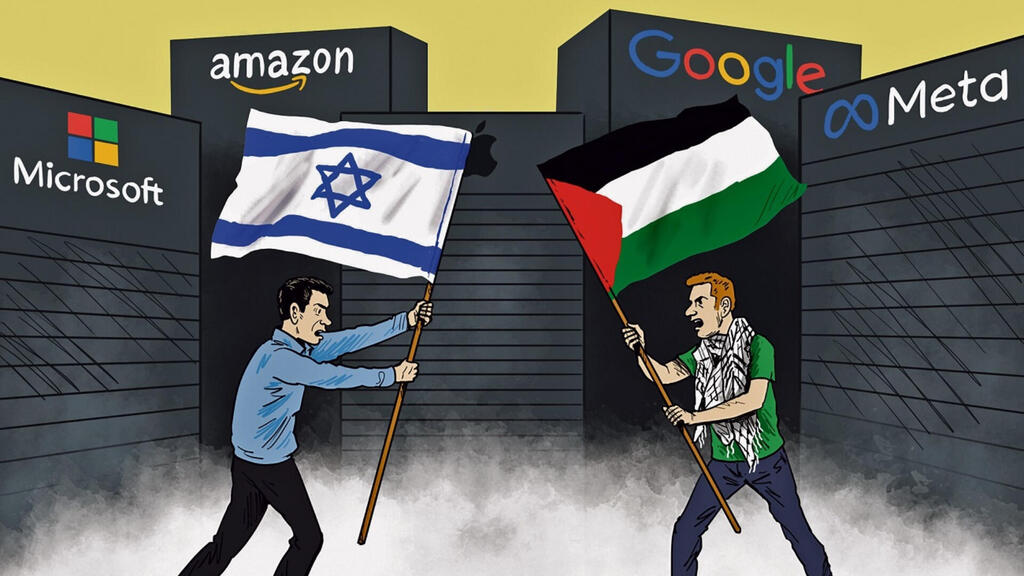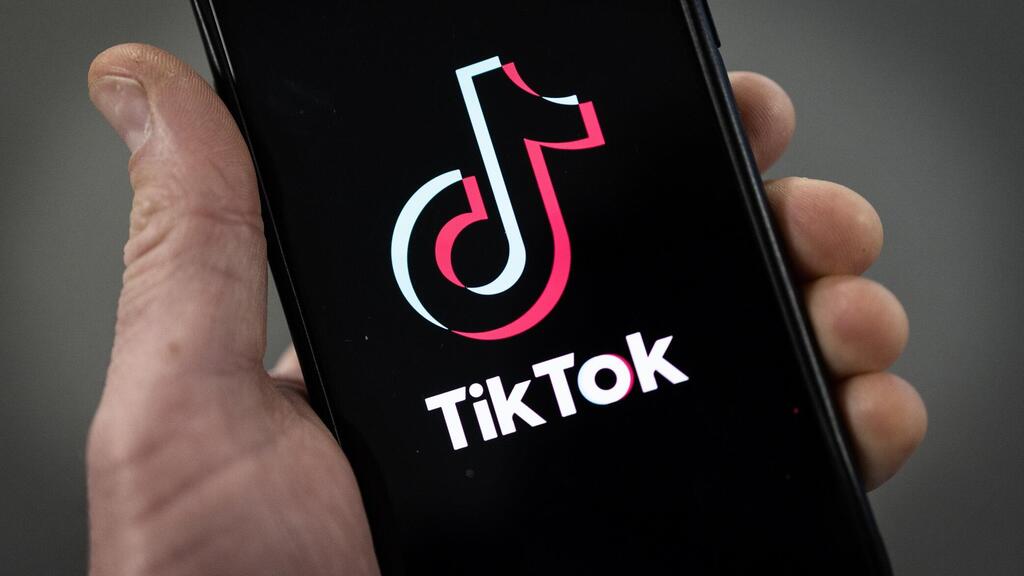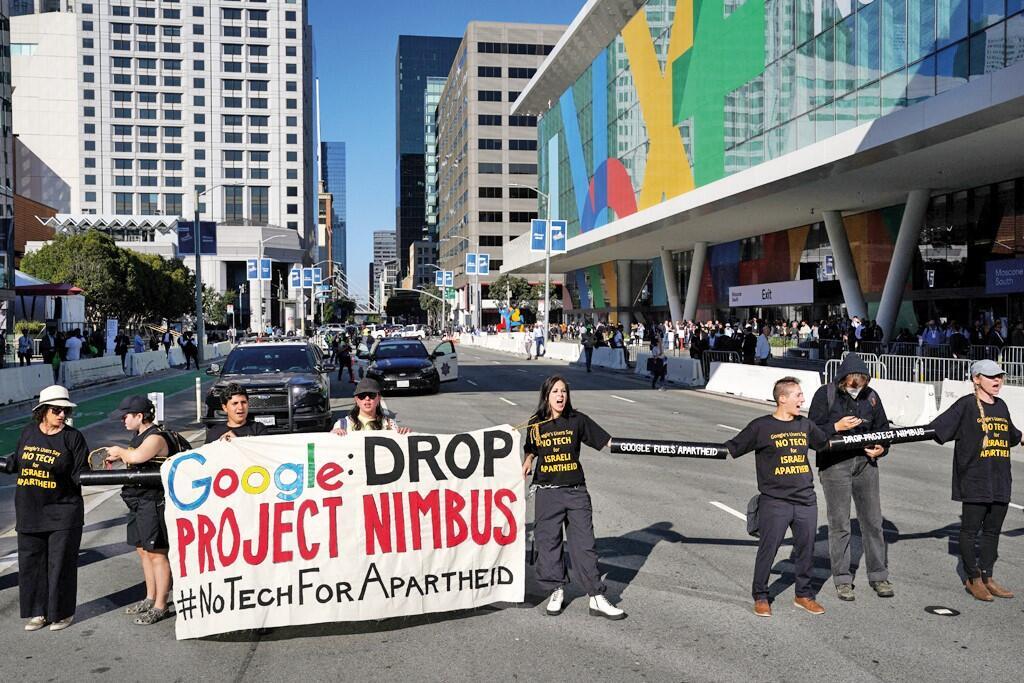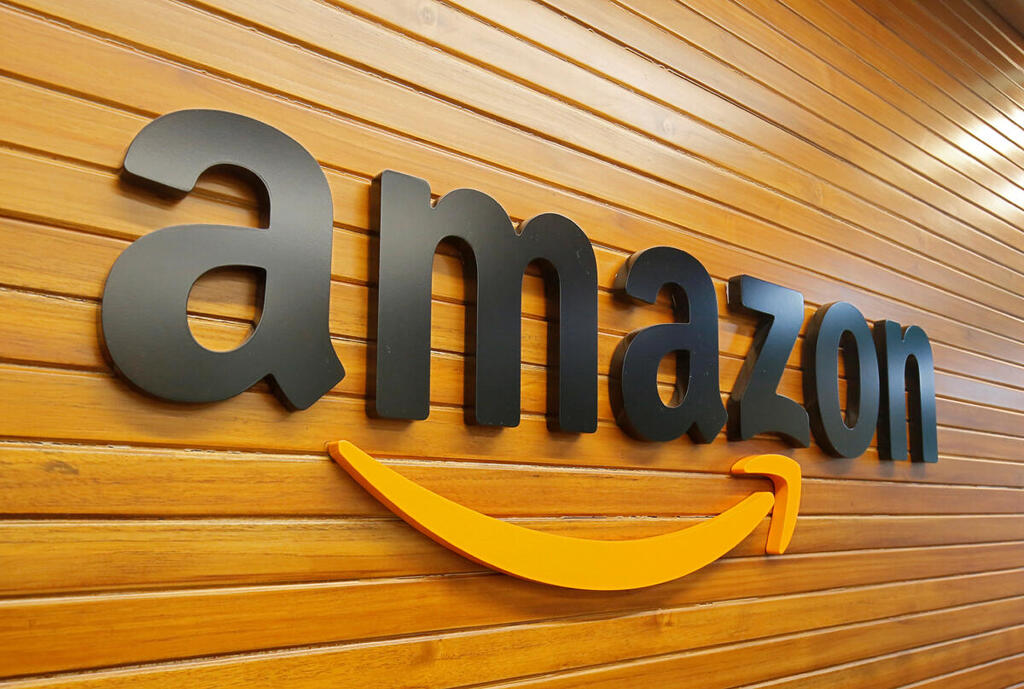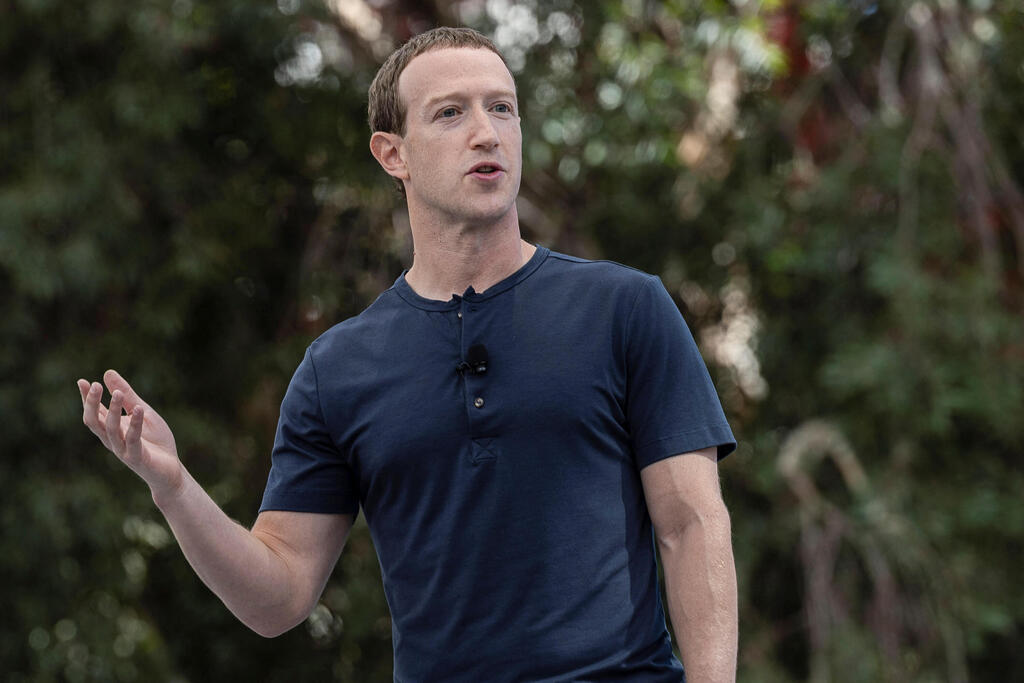Getting your Trinity Audio player ready...
Last week, Amazon hosted its “re:Invent 2023” event, the largest conference for AWS, the company’s cloud services division. The conference was attended by around 65,000 employees and partners. Not in attendance this year was 27-year-old Israel R&D plant engineer Sasha Troufanov who, along with his girlfriend, Sapir Cohen, and his grandmother, was kidnapped from Kibbutz Nir Oz to Gaza on October 7th. His father was murdered by Hamas terrorists. Sapir, his mother, and his grandmother have been released. Sasha remains in captivity in Gaza.
More stories:
It's been two months since the kidnapping and Amazon, which employs over 1,500 people in Israel and has a Jewish CEO, Andy Jassy, is yet to issue a statement mentioning the kidnapped employee. In cooperation with the Abducted and Missing Families Forum, some of Sasha’s friends from work went along to the conference in Los Angeles and gave out t-shirts printed with his picture and the words “Wish you were here.”
They hired a truck that drove around the city displaying his picture and a message to company executives telling them to break their silence and not abandon the hostage. This message was also projected on billboards along Sunset Strip.
Sasha’s friends’ anger at AWS is especially fierce when compared to actions taken by further tech giant, Nvidia. This company also has an R&D center in Israel employing 3,300 workers, one of whom, Avinatan Or, was kidnapped to Gaza on October 7th. Nvidia CEO, Jensen Huang, mentioned Or’s kidnapping in his first letter to company employees immediately following the massacre, and the company has since kept in close contact with the family.
Huang, a friend of Eyal Waldman, founder of Mellanox which was sold to Nvidia, whose daughter Danielle and her boyfriend were murdered at the Nova festival – has been expressing constant support both for Israel and his employees in Israel. “Do you have colleagues in Israel?” he wrote to his employees in the United States. “Send them an e-mail. Talk to them. Tell them you’re thinking of them. Hundreds of our employees are fighting terrorists. Support them.”
Quran verses in Slack
The Israel-Hamas war is the source of an unprecedented headache for the management of international companies in general, and tech companies in particular: These giant companies employing tens of thousands of workers regard themselves as representing people from diverse countries of origin, sectors and opinions both in the United States and at their branches across the globe.
“Diversity” is a hallowed word in these companies. Most of them have invested in Israel and hold successful large-scale R&D centers in the country. Google, Amazon, and Microsoft have even invested billions in server farms serving companies, organizations, and government bodies. All this now constitutes ammunition against them, and it’s being aimed at them at home.
Since October 7th, tensions within these companies between Israel supporters and Palestinian sympathizers - including those not supporting the massacre, but demanding public recognition of the suffering of the population in Gaza – have been disrupting the peace at their pastoral campuses primarily in the United States.
These tensions are running high and are visible mainly in internal messaging groups and in company cafeterias. The strain between team members is already posing a threat to the work itself. Two months into the war, following warnings by company executives, senior managers are cautious about expressing their views. Many employees, on both sides, regard themselves as threatened and are complaining that they cannot freely express their opinions.
In the days in the immediate aftermath of the massacre, almost all top industry executives – from Andy Jassy through to Mark Zuckerberg, Google CEO Sundar Pichai, and Microsoft CEO Satya Nadella issued statements strongly condemning Hamas, declaring their support for Israel and allocating generous bonuses to employees in Israel.
Now, however, following reports of thousands killed in Gaza, they’re recruiting top PR specialists to formulate carefully calculated “balanced” messages. The humanitarian aid too, in its tens of millions of dollars, is equally divided between victims in Israel and aid and rescue organizations in Gaza.
Since the war began, Israeli and Jewish employees in big tech companies have been complaining about hate and incitement in their chat groups – that are not appropriately addressed by management. Microsoft’s internal company messaging system, Viva Engage, has become a platform for ferocious arguments, angry responses, and outbursts of hate.
According to financial news website “Business Insider”, employees expressing pro-Palestinian views have described Israel’s actions in Gaza as “ethnic cleansing” and have blamed their co-workers who support Israel for “allowing Genocide on Gaza.”
The responses to these attacks were no less vociferous: "You are basically supporting the rape, killing, and kidnapping of women, kids, and grandparents." At a certain point, the company intervened, deleting posts and responses it viewed as explicitly inciteful.
American Fox Business published a disturbing study showing that, since the war began, Jewish and Israeli employees at Chinese-owned TikTok are subject to harassment, personal attacks, and calls for boycott. Interviewees reported posts in internal chat groups expressing joy following Hamas’s massacre, and claim that management is systematically ignoring complaints and reports filed.
Jewish workers in company centers in the United States, Britain and Europe have even reported physical threats from their colleagues. The study claims that, in internal chat groups, TikTok employees have boasted that they‘re changing the social network’s algorithm so as to deliberately flood it with anti-Israel content. Other employees, responsible for filtering offensive or violent content, have bragged about ignoring videos that disseminate fake news about Israel or include problematic pictures from Gaza.
An Israeli employee at an overseas branch claimed that once this "sensitive period ends", TikTok will "not likely retain many of its Jewish employees." TikTok is keen to stress that these claims “do not reflect the experience of the majority of our employees."
It doesn’t end there. Microsoft encouraged initiatives of employee donations to war victims in both Israel and Gaza and has pledged to double donations with their own contributions. The company was soon surprised to learn that one such initiative was accompanied by a fake-news text about the “Israeli bombing” of Al Ahli hospital and further unfounded accusations. The text was removed and a decision has since been taken that any wording requires approval.
Employees accused the company of double standards constituting a pro-Israel bias and a betrayal of the company’s own values. In one post via Viva Engage, an employee wrote that “It feels very hard to witness what can only be described as ethnic cleansing, which is not only backed up by most of the Western media but also ignored by the senior leadership of the company I work for every day."
Microsoft stood its ground, but on November 8th, after over 1,000 employees signed a letter urging the company in support of a cease-fire, company CEO Nadella issued a statement stressing concern for both “our Jewish and Muslim colleagues.” Only a week later on November 16th, Microsoft was forced to block hate-posts against Jews and Israel on the All Company channel on Viva Engage which circulates messages to all of Microsoft's 400,000 employees and vendors.
Internal reports suggest that Apple – famed for its extreme discretion regarding the goings-on within its walls - was forced to indefinitely suspend two employee Slack channels, usually serving as social platforms for Jewish and Muslim employees - Apple Muslim Slack and Apple Jewish Slack - so as to “ensure a respectful environment for our communities during a painful and tragic time.” Employees reportedly posted on the channel Quranic verses and organized protests in response war.
'No Tech for Israeli Apartheid'
While Jews are experiencing a global campaign of hatred and incitement, resonating on social media, Arabs and Muslims in tech companies claim they’re being silenced and are complaining that they, themselves, feel threatened.
At Google – where CEO Pichai rushed to convey a warm message of solidarity with his employees in Israel immediately after the October 7th attack and where anger from within toward the company is only growing, they are yet to issue a statement fiercely condemning the loss of Palestinian lives.
Google was in the same position two years ago when the company experienced employee dissent regarding providing cloud services to the Israeli government. The war in Gaza revived the matter as last month a petition made the rounds at the company demanding canceling the deal.
In this petition, Israel’s attack on Gaza is described as “genocide” and it claims that “through Project Nimbus, Google is complicit in the mass surveillance and other human rights abuses which Palestinians have been subject to daily for the past 75 years, and which is the root cause of the violence initiated on October 7th.”
Pichai and Google Cloud CEO, Thomas Kurian, are being called on to publicly condemn Israel’s actions. “Anything less is acquiescence and complicity.” The petition has thus far garnered 500 signatures.
Last Tuesday evening, 50 Google employees gathered holding protest signs near the Google campus in Chelsea, New York. They were demonstrating against the company’s management and paying tribute to Mai Ubeid, a Google developer with muscular dystrophy, who was killed with her entire family in an Israeli airstrike on Gaza.
Despite Ubeid's friends’ efforts , Google has so far in no way expressed either sympathy or sorrow for her death. For Mohammed Khatami, a Google software engineer and one of the organizers of the vigil, the silence of the company and of CEO Pichai on Ubeid’s death “is a betrayal in the purest sense of the word.”
The event was naturally also used to protest against the company and what attendees described as Google’s bias toward Israel, as well as to repeat the old reproach of the company’s involvement in the Nimbus project. They claimed that “Amazon and Google are helping to make Israeli apartheid more efficient, more violent, and even deadlier for Palestinians.”
Amazon is also a partner in the Nimbus project and has established a large server farm in Israel. Amazon sources in the United States are reporting growing tensions between Arab employees expressing support for the Palestinians, reapplying pressure to withdraw from the project, and employees in Tel Aviv and those supporting Israel.
The Jewish Insider website published an article this month revealing that the words “From the river to the sea” had been spray painted in the elevators at company offices in New York and Seattle. According to Israeli reports, company management denied workers’ request to close the “Arabs at Amazon” internal Slack group that includes incitement against Israel and denial of the October 7th massacre.
The group was also used to organize demonstrations entitled “No Tech for Israeli Apartheid.” The company issued a statement clarifying that at Amazon, “we do not tolerate discrimination or harassment of any kind and thoroughly investigate all claims and take appropriate action.”
Last weekend over 1,700 employees submitted a petition to Andy Jassy, demanding Amazon cancel all contracts with Israel and call for an immediate ceasefire in Gaza. Although Amazon employs over 1.5 million people and this might therefore sound like a very low number, a similar petition against Nimbus two years ago gathered only 300 signatures.
This wasn’t the only initiative. Around 100 Amazon employees, on over 20 different websites, marked November 29th - the date of the 1947 UN Partition Plan - as an “International Day of Solidarity with the Palestinian People.” True, it’s a minority, but it’s a vocal minority: In London, they demonstrated in keffiyehs during work hours outside the building’s main entrance. At two sites, events were disrupted by other workers waving placards and pictures of the Israeli hostages.
Meta's strict guidelines
Meta (formerly Facebook) has surprisingly been beyond the realms of such internal conflicts. “Workplace”, Meta’s internal communication platform, is almost storm-free - possibly due to Facebook’s long history of spending years filtering controversial subject matter. Meta was ready: The company published its strict rules of discourse a year ago and oversees them vigilantly.
On the days immediately following the massacre, a seemingly well-meaning post went up on Workplace, calling to “Pray for Palestine.” The post was deleted, to the dismay of employees who claimed that similar posts calling to “Pray for Israel” had not been deleted.
According to AP, two days after the massacre, in an e-mail addressed to Meta managers, Vice President of HR Janelle Gale wrote that Meta employees are allowed "to acknowledge and show sympathy for civilian victims and those impacted, or have a moment of silence all who are affected," but are not allowed "to express prayers for armed forces, have a discussion or debate about armed conflict/war, share stories that are graphic or depict violence, or say "I stand with <nation>," or other related sentiments."
In Israel, although Israelis working for tech giants are active on internal messaging networks, interviews conducted last week indicate that they do not feel threatened or sense the tension experienced by their fellow Jews and Israelis overseas. According to the Democracy Institute, Arab Israelis constitute only a very small minority of hi-tech employees in Israel, together with Ultra-Orthodox employees making up just 4% - perhaps this time round, averting friction.
That said, in the months before the war, over 200 investment funds and startups in Israel joined in an initiative called “Power in Diversity”, aiming to “promote diversity, equity and inclusion in the Israeli tech ecosystem.” The first challenge was naturally the controversy surrounding judicial reform. Over the past month, however, they developed a support program to help companies address issues connected to relations between Jews and Arabs during the war. It aims to identify conflicts developing between employees and provide managers with tools to address them.
Galit Desheh, the initiative’s professional manager: “The present policy at most companies is to avoid dealing with the situation, despite the fact that repressing it will likely impair workers’ sense of safety and security. The present situation endangers the work conducted in recent years toward diversity in Israeli hi-tech and we’re strongly committed to supporting companies to help them pull through and make them even stronger. “



